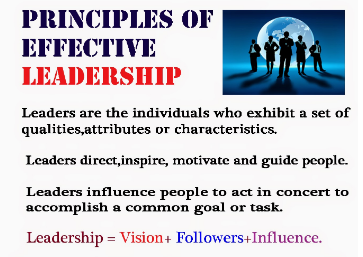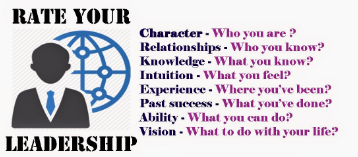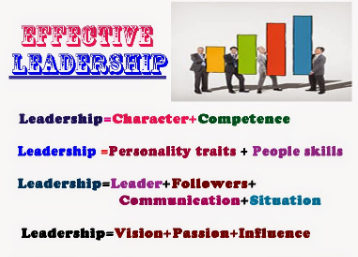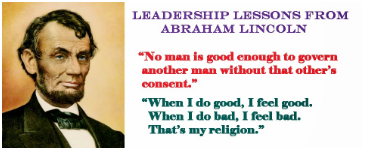Effective leadership -A Article on it's Definition,characteristics,Qualities,styles,Quotes,skill,concept,factors,theories,Roles,Components & Leadership lessons from Abraham Lincoln
Effective leadership -
A Article on it's Definition,characteristics,Qualities,styles,Quotes,skill,concept,factors,theories,Roles,Components & Leadership lessons from Abraham Lincoln
Leadership is one of the most complex human behaviors. Leadership is a multidimensional process that is conceptualized as a trait, as an ability, as a skill, as behavior, as a relationship and as a process (Northouse 2015, author: Introduction to Leadership). Effective leadership is a key factor in the survival and success of an organization. Leaders can make the difference between success and failure. A leader is a person who directs, organizes, administers, makes decisions, delegates possibilities and plans for the future. Effective leadership needs skills, styles, character and the spirit of serving to be effective, efficient and productive. Leaders need to have a vision, communicate that vision with a passion so followers are inspired. Successful leaders have a strong desire to lead and exercise power, exhibit honesty and integrity and are highly self-confident. The world’s most effective leaders –Gandhi, Mandela, Churchill, Lincoln, Thatcher, Mother Teresa, etc. – display widely different personal qualities.Effective leadership -A Article on it's Definition,characteristics,Qualities,Styles,Quotes,skill,concept,factors,theories,Roles,Components & Leadership lessons from Abraham Lincoln
 |
| Image of Effective leadership -A Article on it's Definition,characteristics,Qualities,styles,Quotes,skill,concept,factors,theories,Roles,Components & Leadership lessons from Abraham Lincoln |
Leadership can occur between the leader and another individual; between the leader and a group, or an organization or a community or a society. Leaders need followers in order to lead. Followers need leaders in order to follow. Leadership is a relational concept. Leadership exists in relation to others (followers). Leadership deals with people in relationships. Jim Kouzes and Barry Posner said, ‘Leadership is a relationship between those who aspire to lead and those who choose to follow.’ So leadership is composed of leaders, followers as well as situations. Leadership is a process of social influence (not power), which maximizes the efforts of others, towards the achievement of a goal (Kruse 2013). Psychologist Bernard Bass (1990) reviewed 28 studies and found evidence that the desire for achievement is an important motivating factor among effective leaders. Successful leaders are characterized as “electric, vigorous, active and full of life.” (Kouzes and Posner 1987). They are ‘tirelessly persistent’ in their activities – especially in communicating their vision to followers (Bass 1990).
Leadership is commonly defined as a process of interaction in which the leader influences others toward goal achievement (Yukl 1998). Leadership occurs among people, involves the use of influence and is used to attain goals. So leadership can also be defined as the ability to influence people towards the attainment of goals. Leadership is a ‘people activity.’ In order to lead, the leader must do something benefiting followers and the followers allow the leader to lead. Leadership is a transaction between leaders and followers. Leadership is a process whereby an individual (a leader) influences a group of people to achieve a common goal.
 |
| Image of Effective leadership -A Article on it's Definition,characteristics,Qualities,styles,Quotes,skill,concept,factors,theories,Roles,Components & Leadership lessons from Abraham Lincoln |
Leadership is composed of four primary factors such as leaders, followers, communication and situation.
Leader –leaders require traits, skills and knowledge. The leadership traits include intelligence, self-confidence, determination, integrity and sociability (Stodgill 1974).
Follower – The process of leadership involves the leader and the followers in interaction. Peter Drucker said, “The only definition of a leader is someone who has followers.”
Communication- Communication skills are the foundation for effective leadership. Communication includes how the leader speaks, listens and learns. Many American presidents like John F Kennedy, Franklin D Roosevelt and Abraham Lincoln have made an impact as great communicators.
Situation – the situation normally has a greater effect on a leader’s action than his/her traits. What a leader do in one situation will not always work in another.
Trait theory – assumes that a leader is born with specific traits that made him/her a good leader. This theory assumes that the leader is different from the average person in terms of capacities, talents, and personality.
Behavioral theory - assumes that anyone can learn to become a good leader because he is not drawing on personality traits.
Transformational theory – assumes that people will follow a leader who inspires and motivates them.
Transactional theory – assumes that people are motivated strictly by reward and punishment.
Leadership function
 |
| Image of Effective leadership -A Article on it's Definition,characteristics,Qualities,styles,Quotes,skill,concept,factors,theories,Roles,Components & Leadership lessons from Abraham Lincoln |
Leadership has three essential roles:
they have to define the task, achieve the task and maintain effective relationships.
they have to define the task, achieve the task and maintain effective relationships.
Planning – seeking all available information and defining the task; developing a workable plan.
Initiating – explaining people the aims and the plan;
Informing – clarifying the task and the plan; summarizing suggestions and ideas coherently
Controlling – making sure that all resources and energies are properly harnessed;
Supporting –setting and maintaining organizational and team values and standards;
Motivating – gaining the goodwill and genuine commitment of the team and each member;
Evaluating –establishing and applying the success criteria appropriate to the field;
Setting an example – leading from the front while exemplifying the qualities and behaviors expected in the team.
Character – the leader’s behavior and personality;
Style –the way leader relates and does the job daily;
Skills – performance, which could be developed on the job;
Service – a leader is a servant first and then a boss. Leadership is a relationship of service to people and purpose (Kouzes and Posner)
The purpose of leadership is to change lives. The leader bears an almost sacred duty to create conditions that enable people to grow and have happy and productive lives (Senge 1990).
Leadership is often thought of as more inspirational or guidance –oriented as well as informal. Leadership relies more on personality traits and people skills. Leadership is thinking creatively and innovatively; empowering others through a focus on execution. A leader who is innovative and produces better results is respected and looked upon. In research conducted in 2008 (McKinsey research), it was found that more than 70% of the senior executives believed that innovation was one of the drivers for organizational growth.
Leadership is often thought of as more inspirational or guidance –oriented as well as informal. Leadership relies more on personality traits and people skills. Leadership is thinking creatively and innovatively; empowering others through a focus on execution. A leader who is innovative and produces better results is respected and looked upon. In research conducted in 2008 (McKinsey research), it was found that more than 70% of the senior executives believed that innovation was one of the drivers for organizational growth.
Four distinct leadership styles are identified based on the relative presence (high-low) of task and relationship behavior:
Telling – (high task-low relationship)
The leader makes the decision. The leader defines roles and tells followers what, how, when and where to do various tasks, emphasizing directive behavior.
The leader makes the decision. The leader defines roles and tells followers what, how, when and where to do various tasks, emphasizing directive behavior.
Selling – (high task – high relationship)
The leader makes the decision and then explains it to the followers. The leader provides both directive and supportive behaviors.
Participating – (low task-high relationship)
The leader makes the decision and then explains it to the followers. The leader provides both directive and supportive behaviors.
Participating – (low task-high relationship)
The leader and followers share decision making. The main role of the leader is to encourage and assist followers in contributing to sound decisions
Delegating – (low task – low relationship)
The followers make the decision. The leader provides little direction or support.
The followers make the decision. The leader provides little direction or support.
 |
| Image of Effective leadership -A Article on it's Definition,characteristics,Qualities,styles,Quotes,skill,concept,factors,theories,Roles,Components & Leadership lessons from Abraham Lincoln |
Leadership behaviors are a function of
Intelligence,
personality traits,
emotional competence,
values,
attitudes,
interests,
knowledge
and experience.
Leadership qualities can be divided into two categories:
traits and core values.
Leadership traits represent WHO you are. They develop over time. Leadership core values represent
HOW you are – the guiding principles for how everyone in an organization thinks and acts.
Intelligence,
personality traits,
emotional competence,
values,
attitudes,
interests,
knowledge
and experience.
Leadership qualities can be divided into two categories:
traits and core values.
Leadership traits represent WHO you are. They develop over time. Leadership core values represent
HOW you are – the guiding principles for how everyone in an organization thinks and acts.
Vision – the sense of vision causes the leader to accept the duties of leadership and inspires others. Leadership is a strong sense of purpose. Warren Bennis said, “leadership is the capacity to translate vision into reality.”
Character – is a significant source of personal power. Character in leadership is pursuing noble ends with noble means with knowledge, skill, and talent. The leader must have drive and determination to stick with difficult tasks until they are completed. Successful leaders remain calm and confident even during tense situations.
Personal integrity – It is the quality of honesty, strength of character and courage of leader. Integrity leads to trust and trust leads to respect, loyalty and ultimately action. Futian Yuan said, “There are three essentials to leadership: humility, clarity, and courage.” Dwight Eisenhower also said, “The supreme quality of leadership is integrity.”
Charisma – Charisma is a Greek word that means ‘divinely inspired gift.’ Charisma means attractive or possessing a certain quality that raises enthusiasm or interest. Leaders are talkative, good looking authoritative or energetic. The result is admiration, enthusiasm and the loyalty of followers.
Energy – To have energy is to have the physical and psychological ability to perform. Ralph Waldo Emerson said, “The world belongs to the energetic.”It is a better indicator of long-term leadership success than many traits.
Competence – competence in leadership is seen as a matter of task accomplishment and interpersonal relations. Task accomplishment involved traits like intelligence and knowledge. A leader must have a keen mind to understand information, formulate strategies and make correct decisions. Interpersonal competence involved the ability to communicate and to demonstrate caring, insight, and empathy. A leader’s interpersonal skills are vitally important in the process of inspiring others toward implementing the vision. By counting attributes per category, leaders must have a ratio of about 60% interpersonal and 40% personality attributes.
Flexibility – those who are adaptable are willing to use alternatives, substitutes, and surrogates. Adaptability is a key component of flexibility as a positive leadership. Adaptability allows the leader to adjust multiple demands, shifting priorities and rapid change. Adaptability helps the leader to be resilient in the face of constraints, frustrations, and adversity.
Sociability – is ready and willing to engage others without anxiety or fear. The leader must be sincerely and deeply concerned about the welfare of people.
Leading groups effectively is a tremendous challenge, a great opportunity, and serious responsibility. Leadership is mobilizing the interest, energy, and commitment of all people at all levels. Bardwick (1996) clearly states that leadership is not intellectual or cognitive but emotional. Noted author Warren Bennis, who has spent over three decades studying leaders described a leader as “one who manifests direction, integrity, hardiness, and courage in a consistent manner that inspires trust, motivation and responsibility on the part of followers, who in turn become leaders themselves" (Johnson 1998). Effective leaders have more drive, honesty, leadership motivation, self-confidence, intelligence, knowledge, creativity and flexibility. Successful leaders accept responsibility and accountability for their actions and decisions. They have clear goals and communicate them to their followers. Great leaders are and always have been of service to their followers first and then leaders into a new, better, more productive life. Effective leaders are both task-centered and people-centered. Current research indicates that emotional intelligence is a crucial factor in leadership effectiveness. Emotionally intelligent leaders are equipped with the insight to see people’s pattern of emotions, the relationship between emotions and how emotional states change from one to another. Raymond Perras, the author of AiM for Life Mastery said, “If choose peak performance, you will learn to apply the right stuff, in the right amount, at the right time.”
“Great leaders inspire greatness in others” – Anon.
 |
| Image of Effective leadership -A Article on it's Definition,characteristics,Qualities,styles,Quotes,skill,concept,factors,theories,Roles,Components & Leadership lessons from Abraham Lincoln |
Abraham Lincoln was the sixteenth president of the United States. He was born on the 12th of February 1809 in rural Kentucky (USA). He served as president from 1861 to 1865, during the American Civil War. During the Civil War, Lincoln was determined to maintain the "Union” of American States at any cost. He fought the war bravely and declared, “A nation cannot exist half free and half slave.” He won the war and kept his country united. Almost all historians judge Lincoln as the greatest president of American history because of the way he exercised leadership during the war. Lincoln had very little formal education but had a strong passion for books and self-learning. His primary means of education was schooling at home using borrowed books and the Bible. As a legislator, he had a reputation of eloquent opponent of slavery. Lincoln married Mary Todd in 1842 and they had four children. He was elected as a president of the United States in 1860, re-elected in 1864 and served from March 4, 1861, until his death. As president, he built the Republican Party into a strong national organization. He is remembered for his character, his speeches and letters and as a man of humble origin whose determination and perseverance earned him the nation’s highest office. Lincoln is often admired for his Gettysburg address, which is considered one of the greatest speeches in American history. He is a symbol of racial equality. Lincoln was assassinated on the 15th of April 1865. His life reveals not only dreams and desires but also his habits of strong direction, dedication, and determination.
Lincoln had a desire to become a great orator. With this aim, he approached his teacher, Mater Graham. The teacher advised him to learn grammar. Lincoln borrowed a grammar book and memorized grammar day and night. Lincoln mastered grammar and attained his goal of becoming the best speaker of his time.
Lincoln kept his ambition focused on serving the people and winning their esteem. It is said by Lincoln that “Don’t worry when you are not recognized, but strive to be worthy of recognition. “Always bear in mind that your own resolution to succeed is more important than any other.”
Lincoln possessed a well-developed conscience and courage. He was morally superior. It is said by Lincoln that “Character is like a tree and reputation its shadow. The shadow is what we think it is and the tree is the real thing.” Lincoln was fair, trustworthy, sincere, straight forward with sound moral principle. He even had the nickname “Honest Abe.” It is also told by him that “I am not bound to win, but I am bound to be true.”
Lincoln possessed the supreme will power
The strength of mind. He is remembered for his courage and leadership, his peacefulness and compassion, his patriotism and devotion to his country. It is said by Lincoln that “It requires more courage to dare to do right than to fear to do wrong.” It is also said by Lincoln that “Live a good life. In the end it is not the years in a life, but the life in the years.”
The strength of mind. He is remembered for his courage and leadership, his peacefulness and compassion, his patriotism and devotion to his country. It is said by Lincoln that “It requires more courage to dare to do right than to fear to do wrong.” It is also said by Lincoln that “Live a good life. In the end it is not the years in a life, but the life in the years.”
He acknowledged the power of hard work to achieve success. It is said by him that “You cannot escape the responsibility of tomorrow by evading it today.” Another occasion he quoted that “I am always for the man who wishes to work.”
Habit of persistence
Lincoln is a great example of persistence.
Persistence means never giving up and to do requires self-discipline. He was defeated for the legislature and lost his job in 1832. He failed in his own business in 1833.In 1836, he had a nervous breakdown. He bought for senate in 1854 and defeated miserably. In 1860, he was elected president of the United States.
Persistence means never giving up and to do requires self-discipline. He was defeated for the legislature and lost his job in 1832. He failed in his own business in 1833.In 1836, he had a nervous breakdown. He bought for senate in 1854 and defeated miserably. In 1860, he was elected president of the United States.
"Someday I shall be president" - Lincoln.
Lincoln was a skilled politician. He was admired for his warm storytelling and jokes. He was a man of principle and ideas. Though he lacked a formal education he was a voracious reader and noteworthy biographer. Lincoln was naturally prudent and cautious but he took bigger political risks.It is said by Lincoln that “Be with a leader when he is right, stay with him when he is still right, leave him when he is wrong.”
Lincoln delegated responsibility and authority. Lincoln knew the value of making requests and persuaded his subordinates to compromise on political/ administrative issues. It is said by Lincoln that “I am a firm believer in the people. If given the truth, they can be depended upon to meet any national crisis. The great point is to bring them to real facts.” On empowerment, it is said by Lincoln that “You cannot build character and courage by taking away a man’s initiative and independence.”
Lincoln understood the power of democracy to govern people of any country. Lincoln described government as one of the people (instituted by content), by the people (operate as democracy) and for the people (protecting their natural rights). It is also said by him that “The people will save their government if the government itself will allow them.” He quoted that “ Public opinion in this country is everything.”
"I have always found that mercy bears richer fruits than strict justice."
"A house divided against itself cannot stand."
"Success is going from failure to failure without losing your enthusiasm."
I hope you like this article "
Thanks for Visiting!!
Top 11 Similar Article About Self-Improvement on Creativity & Effective Leadership
1.Dimensions of will power -The greatest human strength, Benefits of will power n Quotes for reflection
2.Optimizing personal performance with 4 basic variables, Tips to live up to your personal best, Human Performance Technology (HPT)
3.Self-improvement strategies
5.Best quotes on Time management
7.Creativity, Personal creativity- the unique human resource, types of creativity, creative process model with Examples, creativity Quotes
8.Effective leadership -A Article on its Definition, characteristics, Qualities, Styles, Quotes, skill, concept, factors, theories, Roles, Components & Leadership lessons from Abraham Lincoln